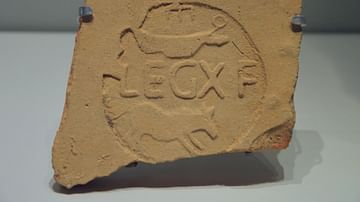Search Definitions
Browse Content (p. 84)

Definition
Anne Bonny
Anne Bonny (also Bonney) was an Irish-born pirate who briefly operated in the waters around the Bahamas before her capture by the Jamaican authorities in 1720. As partner to the English pirate John Rackham, aka ‘Calico Jack’, Bonny dressed...

Definition
Legio X Fretensis
Legio X Fretensis was a legion of the Roman army formed by either Julius Caesar or Augustus. The legion spent most of its existence in the East, primarily in Judea. It participated in Corbulo’s two Armenian campaigns as well as Vespasian...

Definition
Proclus
Proclus of Athens (c. 412-485 CE) was a prolific Platonic philosopher whose main aim was the seemingly impossible task of defending traditional Greek polytheism at the time when his contemporary culture was almost completely dominated by...

Definition
Blackbeard
Blackbeard (d. 1718), otherwise known as Edward Teach (probably an assumed name), was an infamous English pirate who operated in the Caribbean and Atlantic during a surprisingly short career lasting just 15 months. With his long black beard...

Definition
Tibetan Book of the Dead
The Tibetan Book of the Dead is the English translation of the Tibetan texts known as bar-do thos-grol (Bardo Thodol) – “Liberation Through Hearing During the Intermediate State” – and serves as a guide for the soul of the deceased after...

Definition
Mahayana Buddhism
Mahayana Buddhism is the largest Buddhist sect in the world, and its beliefs and practices are what most non-adherents recognize as "Buddhism" in the modern era. It developed as a school of thought sometime after 383 BCE, possibly from the...

Definition
Gertrude Bell
Gertrude Bell (l. 1868-1926) was an archaeologist, travel writer, explorer, and political administrator responsible for creating the borders of the countries of the Near East after World War I and, especially, for the foundation of the modern...

Definition
Treaty of Tordesillas
The 1494 Treaty of Tordesillas (Tordesilhas) was an agreement between the monarchs of Spain and Portugal to divide the world between them into two spheres of influence. The imaginary dividing line ran down the centre of the Atlantic Ocean...

Definition
Tara
Tara is a female deity in both Hinduism and Buddhism who personifies compassion and offers salvation from the suffering of rebirth and death. She is thought to have been born of empathy for the suffering world and is regularly invoked for...

Definition
Prince Henry the Navigator
Prince Henry the Navigator (aka Infante Dom Henrique, 1394-1460) was a Portuguese prince who famously helped capture the North African city of Ceuta, sponsored voyages of exploration with the aim of building colonies in the North Atlantic...